| I had a moneybox
as a child that was
in the form of a till or
cash register. It
had a few levers, which
when pressed down, rang
up an amount of money
and at the same time
caused a drawer to
open. Mercifully, it also
had a No Sale lever
that allowed the opening
of the drawer
without an intention of making
a deposit. It would
therefore seem easy for
me to get the necessary
money to buy a ticket on
the following Monday to
see How to Marry a
Millionaire were it
not for the fact that the
cupboard, or rather the
drawer, was bare. Obviously
I had spent what money I
had. I was now faced with
having to get nine
pence by Monday, a
mere three days away! If
I wanted to get to the
cinema by bus, then
another three pence would
be needed for the ride
there and back on the
number 653
trolleybus. The total
amount required was
therefore one shilling.
By today’s
standards, this amount is
nothing – five
new pence – ten
cents – a dime!
However in 1953, this
amount actually bought
something and was, to
a child, no small amount.
Still, never say die!
I had the weekend to find
the money. 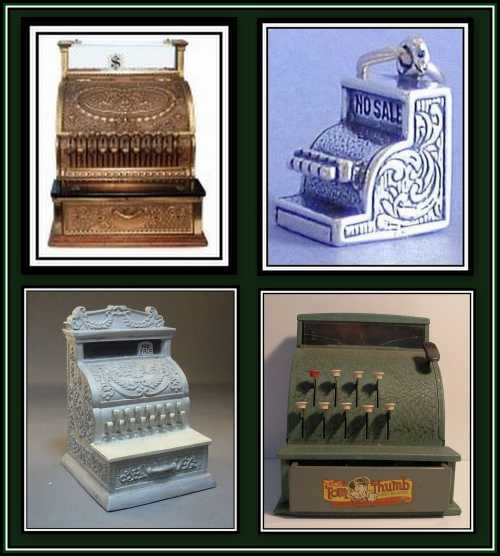
The reader
might be wondering why I
did not ask my parents
for the money. I did not
want to chance this
at this time,
as I knew full well that
my mother would not allow
me to go to Hackney alone
and since neither she nor
my father would be able
to accompany me as they
would be working, I could
not go. The reader
should remember that her
reticence regarding Hackney
was not as a result
of the Borough being
especially dangerous, but
was rather a matter of my
age. She undoubtedly
would have felt that I
was far too young to go
alone, thereby ending any
chance I had of going.
No, I had to come up with
the money myself and then
sneak away, see
the film and return home
with my parents being none
the wiser. Of course,
I reasoned, if I failed
to come up with the
necessary money, I
planned to throw caution
to the wind since I
had nothing to lose and
ask them for the money.
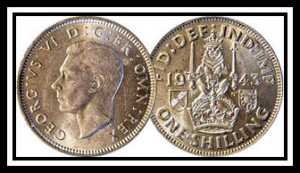  Meanwhile,
I had to think and come
up with a way to get the
necessary shilling. I
knew on that Friday
afternoon that it
wasn’t going to be
an easy task, but I was driven.
I had to see the film
and so set about
thinking of a way to come
up with the money. After
a while, an idea came
into my mind that most
certainly would have
given me to the necessary
money. I would have
pursued this idea to the
end were it not for the
fact that immediately it
came into my mind, it
caused me to shudder and
to feel instant shame.
The reader may agree that
a conscience puts
paid to many a good
plan! Meanwhile,
I had to think and come
up with a way to get the
necessary shilling. I
knew on that Friday
afternoon that it
wasn’t going to be
an easy task, but I was driven.
I had to see the film
and so set about
thinking of a way to come
up with the money. After
a while, an idea came
into my mind that most
certainly would have
given me to the necessary
money. I would have
pursued this idea to the
end were it not for the
fact that immediately it
came into my mind, it
caused me to shudder and
to feel instant shame.
The reader may agree that
a conscience puts
paid to many a good
plan!
My mother
was a great believer in
insurance. Every other
Monday morning, the
insurance agent called to
pick-up the premiums.
This was common-place in
those days and these men
would walk from shop to
shop and house to house
collecting a small amount
of money from each. I
don’t ever recall
hearing of any that were
robbed, but I suspect
some were. My mother
would put the required
amount into a money
bag that she had
received from the bank
whenever she collected change
for the shop from
them. She kept the bag in
the lower left-hand
drawer of the sideboard
in the parlour so
as to have easy access to
it once the insurance man
came to call.

I was
brought up to be honest.
This was drummed into
me as a child by my
mother. She said that
stealing was a crime and
that once a person
committed a crime, they
lost their good name. And
once lost, this was
something that could
never be got back. To her
and to most people of her
generation, having a
good name was vital
to their existence. On
that Friday afternoon, I
had thought about her
little stores of money
about the house and of
the insurance money in
the lower left-hand
drawer of the sideboard
and wishing that I
could help myself to
some. Despite a strong
wish to lift some since
I really wanted to go to
the pictures, the thought
of losing my good name
was too awful to bear.
It caused me to shudder
and to feel a sense of
shame. I was left with
the knowledge that if I
were to go to the
pictures on the following
Monday, then I would have
to come up with it
another way. As I said, a
conscience and a sense
of doing right can
often seem to take the
joy out of life.
On the
Saturday, I remember
trying to be, what I
thought, was especially
helpful. I offered to do
things about the house in
the hope that it might
bring me some pennies,
but what I was
offering to do turned out
to be the jobs that I was
supposed to do! In
desperation I offered to
make some tea for my
father in the afternoon.
I thought that this might
soften him up and
that it might cause him
to give me a reward.
Tragically, my tea never
came up to my
father’s expectation
and he was furious that his
son was such a
failure when it came to
this art! Following
my dismissal from the
kitchen, I went up the
Waste, the market on Whitechapel
Road, in front of the
London Hospital. Surely
someone would have
dropped a penny or two
and I might then be lucky
enough to pick it up. I
remember that I had once
found a sixpence as
I was crossing Brady
Street and hoped to
be as lucky again. Alas,
there was no treasure
trove on the streets of Whitechapel
on that afternoon. I
went to Paul’s
stall where he gave
me some money to buy him
a cup of tea and a drink
for me. I remember asking
the cafe owner if he
would give me the cost of
the drink rather than the
drink itself. Either he
did not hear or he chose
not to hear me and I left
with a cup of tea for
Paul in one hand and an
orange drink for me in
the other. Where were the
streets paved with gold
that filled story books,
I wondered?

The Waste
Tomorrow
was Sunday and I would
then be desperate.
However, what is it that
they say? Something about
it is always darkest
before the light?
My father
had the habit of disappearing
periodically when I
was a child. Quite
suddenly, for what would
seem for no apparent
reason, he would take
off and be gone for
a week or so. Not only
did he go, but would do
so without telling my
mother where or why he
was going. During his
absence, we sat and
worried, not knowing
where he was. All we knew
that he had left, taking
all of the available
money with him and was
obviously enjoying
spending it on drink for
himself and others.
My father
would return as suddenly
as he left. Despite my
mother’s demands, he
never said where he had
been. He returned home
without any of the money
that he had taken from my
mother’s store
that she kept in a cash
box for food and
sundry expenses. Should
this amount prove too
little for his needs, he
would pawn one of his
suits. Whenever he ran
off, my mother always
checked behind a large
mirror in the parlour,
and invariably
found a pawn ticket.
Once such a ticket was
found, we knew that my
father would not be seen
for a week or so.

EastEnd
Pawn Shops
The
Dundee Arms was once a
Pawn Shop
My
father’s refusal to
tell my mother where he
had been while away both
frustrated and annoyed
her. My mother was hurt
and never understood why
my father needed to run
off, giving no
thought to us. Whenever
she would ask where he
had gone or if he was
aware that he had left us
with money for food, he
would sit in his chair
and remain silent. He
never offered us any
explanation to account
for this behaviour.
When I was
a little older, my
parents gave up the pie
and mash business and
my father went to work
for British Railways.
Unfortunately, a change
in profession did not
cause him to change his
way and he still
continued to ran off periodically.
While my parents had the pie
and mash shop, my
mother maintained the
business in my
father’s absence and
opened as usual.
Following our move, she
was no longer chained
to the business and I
recall that on one of my
father’s excursions,
she decided to see if he
had gone to visit some of
his relatives who were
living in South
London. Although my
mother liked very much my
father’s father and
stepmother, she did not
like his
stepmother’s
children from her first
marriage.
My father
had a half-sister,
named Florence, known as
Florrie, who had led a
life dedicated to fun
and frivolity and was
renowned for her poor
taste in men. She and her
husband of the
time, a man known as Wagie,
suffered from the
constant need to move
home since neither worked
with any frequency and
had problems paying the
rent. As soon as they
scraped together any
money, they would spend
it on drink and betting.
My mother never warmed
to Florrie and we
only saw her on rare
occasions – very
rare occasions.
I cannot
remember the reasoning,
but once when my father
had taken off, my
mother seemed convinced
that he was billeted with
these family members. I
am unsure how, but my
mother had obtained
Florrie’s current
address and she was
determined to find out if
her hunch was true. And
so my mother and I
crossed the river and
went to Camberwell, which
was where Florrie and Wagie
lived.
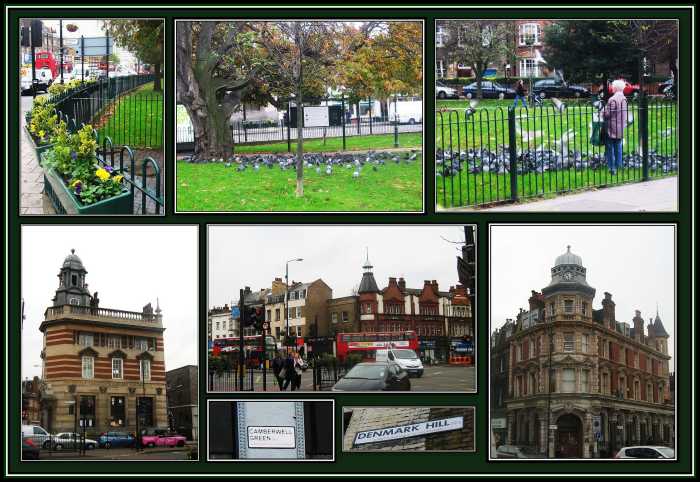
Camberwell
Green
I remember
getting off the bus at Camberwell
Green and walking
along an endless number
of little streets before
finally arriving at the
house. My mother knocked
at the door. Florrie
opened it and appeared
somewhat frightened.
Immediately, she began
making excuses in a very
nervous voice to account
for my father’s
presence in her home. My
mother, with me in tow,
entered the house and
found my father sitting
at the kitchen table
alone. Apparently Wagie
was somewhere else. We
did not miss not seeing
him. My mother was
furious both with my
father and with Florrie.
Both sat at the table
with their eyes down and
said nothing. I remember
my mother asking Florrie
if she was not aware that
the drinks that my father
had bought for her had
been purchased with money
that should have bought
food for me! Florrie had
sense enough not to
answer, but continued to
stare at her hands folded
in her lap.
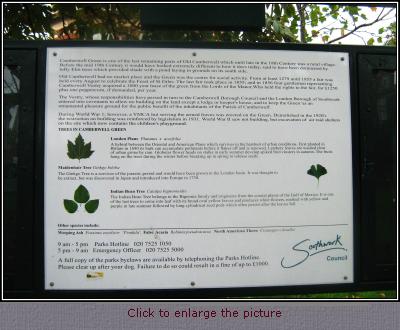 Although
this situation may sound
Victorian and
melodramatic, it was
nonetheless true, I am
sorry to say. Once my
mother had finished
expressing her opinion of
both Florrie and my
father, she announced
that she and I were going
home. My father, still
looking sheepish, got up
and spoke for the first
time. He said, not daring
to look at either of us,
that he would accompany
us home. Prior to sweeping
out the door with my
silent father and I, my
mother turned and advised
in quite strong terms
the pathetic Florrie
to discourage any such
future visits from my
father. I don’t
recall ever seeing my half-aunt
ever again. Although
this situation may sound
Victorian and
melodramatic, it was
nonetheless true, I am
sorry to say. Once my
mother had finished
expressing her opinion of
both Florrie and my
father, she announced
that she and I were going
home. My father, still
looking sheepish, got up
and spoke for the first
time. He said, not daring
to look at either of us,
that he would accompany
us home. Prior to sweeping
out the door with my
silent father and I, my
mother turned and advised
in quite strong terms
the pathetic Florrie
to discourage any such
future visits from my
father. I don’t
recall ever seeing my half-aunt
ever again.
Although
my father was caught at
his half-sister’s
home, a place I am
sure that he had gone to
numerous times before, he
did not change his
ways. He continued to
disappear for many
years to come.
With time
and the ability to earn
sufficient money to take
care of our immediate
needs, my mother
eventually gave up
worrying about him. Once
she reached this
position, whenever he went
away, she would shrug
her shoulders and say let
him get on with it.
However, while I was
still very young, my
mother was shaken
whenever such a disappearance
occurred. His
behaviour hurt her very
much and she could never
understand why he went.
Despite this, and being a
practically minded woman,
my mother knew that she
had to take charge and
see that we were fed and
clothed and had a roof
over our heads since
she could not rely on my
father to help provide
for us at all times.
Fortunately, early in my
mother’s married
life, she realised that
she had married a man who
might be gone at any
minute. As a result
she sensibly took
control, and thanks to
the good habits learned
as a girl, she was able
to take care of us while
my father was away.
When my
mother was a child, she
lived in one of the
poorest areas of the East
End of London. At
that time, people earned
very little money and
learned to live on very
little, or, as they used
to say, lived from
hand to mouth. Many
families in Bethnal
Green had to rely on
the goodwill of the
various Missions and
Societies that
existed, such as
the Salvation Army, to
feed them when they were
unable to make ends
meet. At that time,
very few people were ever
able to save any money
and no one had a bank
account. Once things
began to improve,
whenever working people
were able to scrape
together some meagre
savings, they began to
deposit it in an account
at the Post Office.
Here their money was safe
and it earned interest,
albeit little by
today’s standards.
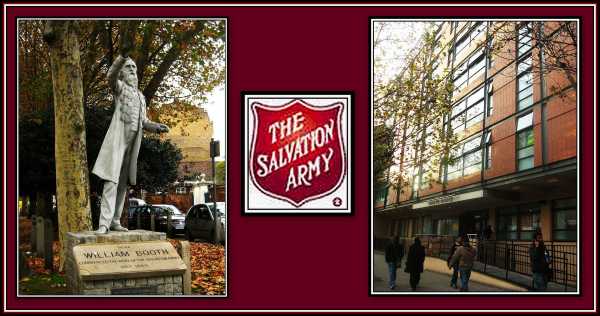
When I was
a child, the Post
Office was still the
primary place where
savings were kept. I
remember my mother taking
me to the Post Office in
Aldgate at a very
young age to open a
savings account. I was
always very happy when it
came time for me to empty
my moneybox of the
pennies, threepenny
pieces and any other
coins that I had been
lucky enough to save. I
would count the coins and
put them into various
piles and note how much I
had to take to the Post
Office for deposit.
It was with great pride
that after standing in
line at the Post
Office for what
always seemed to be an
eternity, I put my
coins on the counter
along with my book and
waited for the man to
check the amount. Once
this was done, he wrote
the amount in my book and
then calculated the new
total. He then returned
the book to me and, after
thanking him, I would
walk with pride out of
the Post Office.
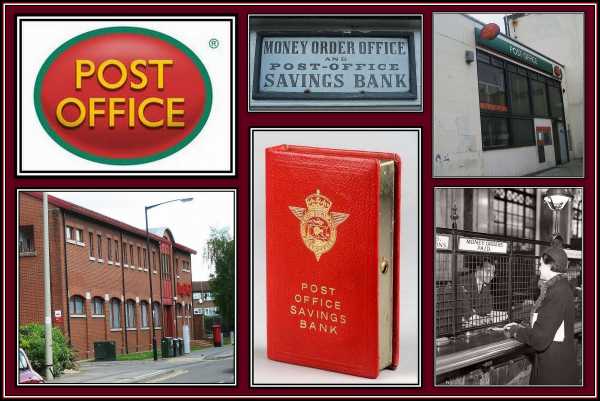
At that
time, very few, if any,
had cheque books. Most
things were bought on a
cash basis or on hire
purchase, which was
just beginning to grip
the nation. Credit cards
had yet to be used by
working people.
Fortunately
for us, my mother had
developed the habit of
saving. Although she was
unable to save very much
on a regular basis, what
she did save added up
and proved to be a
life saver when
needed. My mother wisely
did not share the
knowledge of this hidden
account with my father
and kept it safe for use
only in the case of a
rainy day. When my
father disappeared with
our available cash, we
did not starve since she
would draw on her emergency
funds. Having had a
difficult childhood
herself with too little
to eat and with too
little money, she knew
how to stretch a
shilling to its
utmost, thank goodness.
In
addition to having an emergency
fund, my mother also
had small stores of money
about the house. She had
learned to do this from Bubba
and Zayde when
she was a child. They, as
I have said came from
Russia, and had
undoubtedly been victims
of discrimination. As a
result of this, they, and
many other Jews, knew
that they might have to run
at any minute in
order to save themselves.
This meant leaving their
home and their
possessions behind and
taking only the clothes
that they wore. Knowing
this, they were certain
to keep a coin or two in
the pockets of their
coat, trousers and
handbag. My mother has
noticed this and asked Bubba
why she did this. My
mother took heed of her
explanation and adopted
the custom for the
remainder of her life. I
have to admit that
whenever my father flew
into a drunken rage when
I was a child and we fled
the house in fear of
our lives, neither of
us left the house penniless!
The reader might be
amused to learn that the
odd coin is found in
every coat that I own as
well as in all other
garments that have a
pocket. One never knows
when one might have to
run!
Anyway,
despite my being brought
up to save money and
having a Post Office account,
I found myself with what
is now called a cash
flow problem. I had
no liquid cash, as
my empty moneybox proved
and I had no obvious
means of making the
necessary money. So how
was I going to get hold
of a shilling?

The reader
may be asking wasn’t
it now the time to throw
myself on the mercy of
my parents and ask them
for the money? It was
still on Sunday. I had
the whole of the day yet.
Perhaps some miracle
would happen. Perhaps
some way might be found
yet.
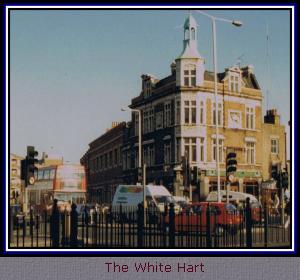 What
was I saying earlier
about it is always
darkest before the light?
When I was a child,
the public houses of
Britain opened for the
licensed drinking of
alcoholic beverages at
noon on Sundays. And a
short time after the
doors were opened to the
welcomed public, my
father would cross Cambridge
Heath Road and enter The
White Hart public
house and imbibe a few
bevies. Often he
would drink just enough
to cause him to feel
happy and return home in
a jolly mood.
Other times he would
return having drunk too
many drinks and would be
in a fighting mood and
we would be ready to run.
On this Sunday, and I
thank God for this still,
he returned home in a
particularly jolly mood.
My father never gave me
any pocket money. After
all, he needed his money
to buy drinks for himself
and total strangers,
didn’t he? My pocket
money came from my mother
and she had strict ideas
about how and when it
should be spent. Although
she had my best interests
at heart, I found her
demands to be somewhat
excessive at times. There
was one good thing about
my father when he was
drunk and in a jolly mood
and this was that he
would become generous,
both with words of
affection and with the
giving of money! What
was I saying earlier
about it is always
darkest before the light?
When I was a child,
the public houses of
Britain opened for the
licensed drinking of
alcoholic beverages at
noon on Sundays. And a
short time after the
doors were opened to the
welcomed public, my
father would cross Cambridge
Heath Road and enter The
White Hart public
house and imbibe a few
bevies. Often he
would drink just enough
to cause him to feel
happy and return home in
a jolly mood.
Other times he would
return having drunk too
many drinks and would be
in a fighting mood and
we would be ready to run.
On this Sunday, and I
thank God for this still,
he returned home in a
particularly jolly mood.
My father never gave me
any pocket money. After
all, he needed his money
to buy drinks for himself
and total strangers,
didn’t he? My pocket
money came from my mother
and she had strict ideas
about how and when it
should be spent. Although
she had my best interests
at heart, I found her
demands to be somewhat
excessive at times. There
was one good thing about
my father when he was
drunk and in a jolly mood
and this was that he
would become generous,
both with words of
affection and with the
giving of money!
My father
was never able to eat his
Sunday lunch since he was
generally full from
drinking. He would start
to eat, but soon push his
plate away barely
touched. By now he was on
the verge of falling
asleep and was at his
most vulnerable. This was
my window of
opportunity and I
seized it with both hands
and asked him for
…… a penny.
His eyes opened and I
remember that he
immediately put his hand
into his pocket. This
action disturbed his
equilibrium and he began
to fall sideways. As he
did I jumped up and ran
to save my dear Daddy!
To steady himself, he
placed a
hand on my shoulder and
with his other hand, he
dragged out the coins
from his pocket and
dropped them on the
table. This action seemed
to exhaust him and he
remained still for a
minute or two. Suddenly,
he turned and looked at
me and examined my face
in depth. This was now my
great chance. I looked
back at him and tried to
appear as charming and as
sweet as I possibly could
and gave him a loving
smile. I must have
succeeded, as immediately
tears to filled his eyes
and, what I can only
assume was guilt, seized
hold of him. At such a
time as this, I suspect
that all of his past crimes
returned to him. As
the tears began to slip
down his cheeks, he grabbed
me and brought me close
to him. He kissed me a
number of times on the
cheeks and between sobs
told me how much he loved
me. While I was being
grabbed, held and kissed,
I caught a glimpse of my
mother as she raised her
eyes to heaven, as if to
say so why don’t
you show it when
you’re sober? My
father was now in a
fully-fledged sentimental
state and, after
releasing me a little so
that I could once again
breathe, he began to tell
my mother and I again and
again, between his tears,
how much he loved us and
that we could have
anything he owned. The
last part of his remark
was redundant since the
poor man owned
practically nothing. This
was because whenever he
did have something
he quickly drank away it
away in the company of
his cronies. Despite
this, I took him up on
his offer and once again
asked him for a penny.
Slowly and
purposefully, he reached
out took up some of the
coins on the table and
next pressed them into
mine. He repeated this
gesture several times. By
the time this display of
love was over, I
had every
coin that was
in his pocket – coppers
(pennies), ha'pennies
(half-pennies), two bob
bits (florin, two
shilling pieces), tanners
(sixpences), thrupenny
bits (three pence coins) and a
couple of
half-a-dollar pieces
(half-crown).
This was quite a
windfall. Needless
to say, I was overjoyed
to receive such wealth
and I was most grateful
to my Daddy for
his generosity.
While my
mother helped my father
up the stairs to bed, I
counted my money and
quickly hid sufficient
monies for my needs. I
now had the necessary
capital to finance the
purchase of a cinema
ticket as well as for the
bus fare, there and
back, and for an ice
cream to be enjoyed
during the interval prior
to the start of the big
picture. Upon my
mother’s return to
the table, she asked me
how much the old sod had
given me. I told her
truthfully the amount
that now stood in proud
piles before me on the
table. She said that I
should save the major
part and put it in my money
box since you never know
when you might need it! She
said that I could keep a
small amount and
spend it as I chose. I
thanked my mother for her
sound advice and part of
me admired her for her
concern for that rainy
day, which would one
day turn up. I knew then
that she was right to
suggest that I save my
great windfall, since
one never knew if, or
when, it might occur
again. Knowing my
mother’s ways had
caused me to sequester
away the necessary
funds to support my
excursion without her
knowledge. This was vital
since the desire to go to
the pictures the next day
had been so strong and
could not be resisted. I
am still not proud of my deceit,
but desperate situations
require desperate
measures, don’t
they?
FOOTNOTE

The City
of Vienna
As I said,
my father did not offer
any heart-felt apologises
for his actions to either
my mother or me while I
was young. Upon his
return, he was always
penniless and extremely
quiet. He offered no
explanation, no excuse
and no apology. On
occasion, when he was
drunk, he might weep and
beg forgiveness for
his past actions. Such weeping
and begging did
not take place when he
was sober. Regardless of
these drunken displays of
regret, he continued to
disappear at periodic
intervals.
It
wasn’t until years
later, once I had
finished college and was
living abroad, that my
father finally admitted
to his poor behaviour.
This came in the form of
a letter that he had
written to me while I was
Vienna. I was
still young at this time
and at the beginning my
career. I had gone to Vienna
to give a presentation at
a scientific meeting.
Regrettably, the conference
planners had arranged
for me to stay at a large
and fancy hotel in the
centre of the city. They
obviously had mistaken me
for a wealthy professor
with unlimited funds and
a wish to see and be
seen. Although my
fare and conference fees
were paid for by my
university, I was
expected to pay the costs
of the hotel myself.
Unfortunately, my
position was such that my
monthly salary was small.
After looking at this
glorious hotel, it did
not take me long to
realise that I could not
afford to stay there.
What I needed was a
simple pension, a
small hotel without
superfluous opulence. I
promptly cancelled my
reservation and soon
found a charming little
hotel with kindly staff
where I had an enjoyable
stay.
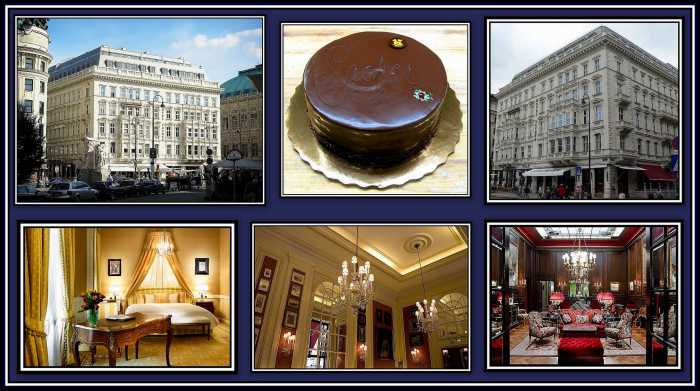
The Sacher
Hotel
Unfortunately,
my father believing me to
be staying at that grand
and glorious hotel in Vienna,
addressed his letter to
me, care of the hotel. It
took about three months
for the letter to be
returned to him and then
forwarded to me. I felt
very sorry for him once I
finally read the letter
since he must have been
under the impression that
I had ignored its
contents. My father wrote
me a charming letter that
contained his regrets for
his past behaviour. He
said that he felt shame
when he thought about the
times that he had
returned home drunk. He
apologised for the times
when he disappeared and
for the times that he
missed during my
childhood.
 My
father had written many
letters to me while I was
away at college and when
I lived abroad. He mostly
took dictation from
my mother, but he did add
little bits himself.
According to my father,
he left school without
being able to read or
write. He said that he
was unable to concentrate
on any lesson other than woodwork
and preferred to play
truant. It
wasn’t until he left
school when he was
fourteen years of age
that he taught himself
to read and write. He
said that he did this by
copying words and
sentences from the
newspaper. Although his
sentence construction and
spelling were not perfect,
his letters were understandable
and a delight to read. I
was always appreciative
of them and understood
the effort that they took
to write. My
father had written many
letters to me while I was
away at college and when
I lived abroad. He mostly
took dictation from
my mother, but he did add
little bits himself.
According to my father,
he left school without
being able to read or
write. He said that he
was unable to concentrate
on any lesson other than woodwork
and preferred to play
truant. It
wasn’t until he left
school when he was
fourteen years of age
that he taught himself
to read and write. He
said that he did this by
copying words and
sentences from the
newspaper. Although his
sentence construction and
spelling were not perfect,
his letters were understandable
and a delight to read. I
was always appreciative
of them and understood
the effort that they took
to write.
As a
result, I was greatly
appreciative of the
letter that he wrote to
me while I was in Vienna.
It must have not only
taken him a great deal of
time to write, but also a
great deal of pain and
regret. I still have his
letter. I keep it along
with a number of other treasures
in what was once his cufflink
and stud box. His
letter went a long way
to helping me forgive
my father for his past
actions. Every now and
again, sometimes when I
notice his box, I open it
and take out his letter
and reread it and
experience the
bitter-sweetness of its
contents once more.
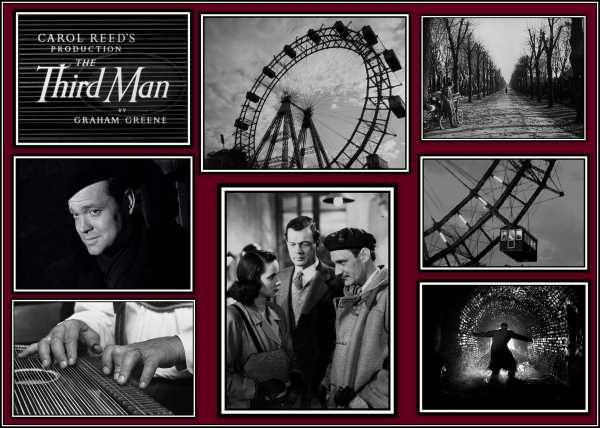
Click on the picture for
a video clip
I
would like to thank Mr.
Brian Hall and Mr. Kevin
Wheelan for their
kindness in allowing many
of their pictures to be
reproduced here.
|